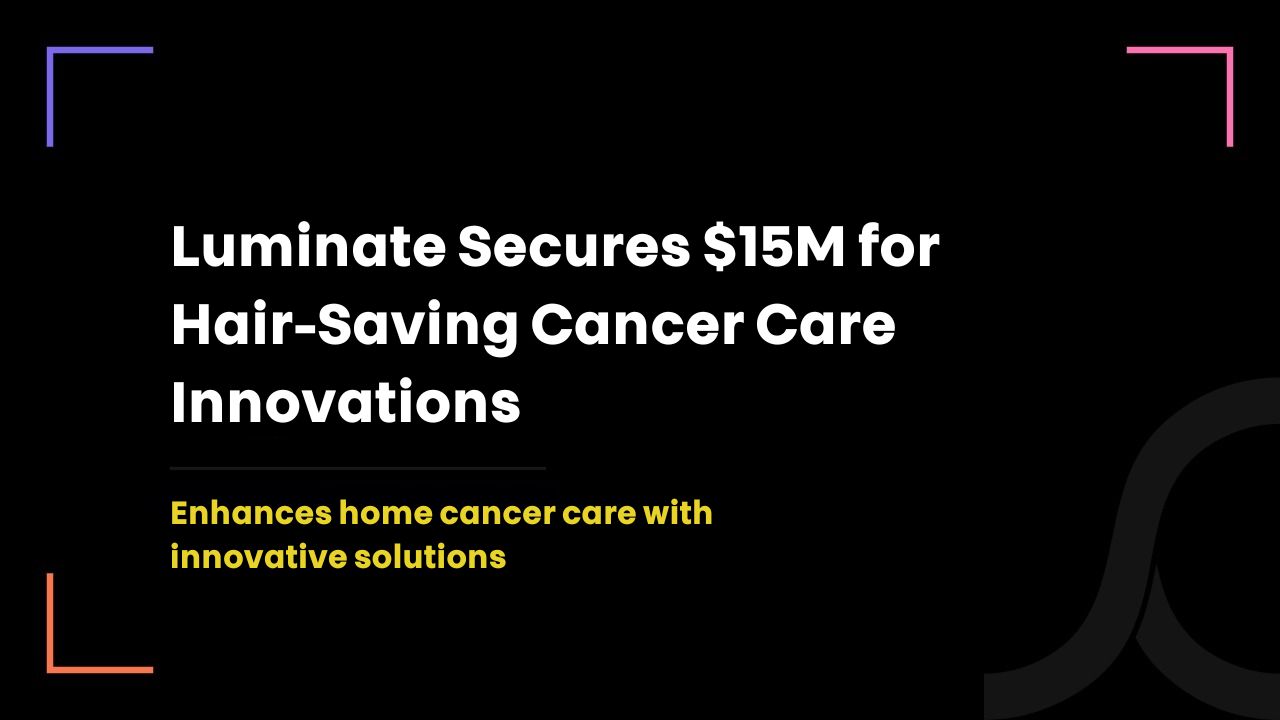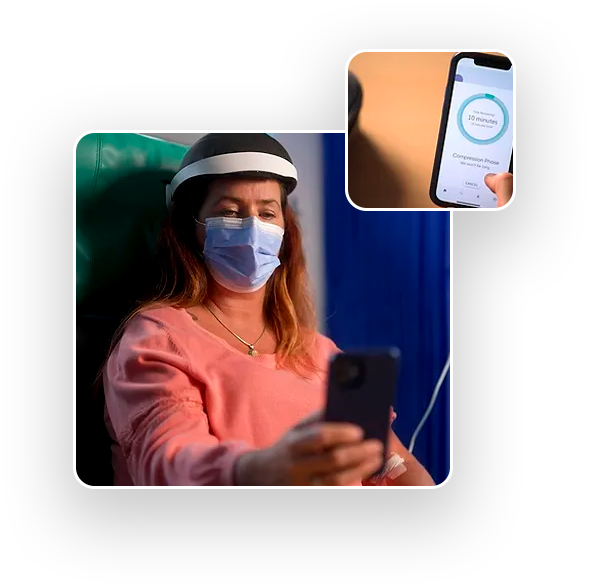How Luminate’s Lily Raised $15M: Takeaways for Home Care Startups

1 year ago
Cancer treatment is tough.
One of the hardest parts for many patients is hair loss during chemotherapy.
Losing your hair can feel really overwhelming.
It affects how you look and can hurt your self-esteem.
For a lot of people, hair loss is a constant reminder of their illness.
This adds to the emotional burden they already carry.
But now, there’s hope. Luminate’s new hair-saving chemo helmet is here to change that.
The device, called Lily, helps prevent hair loss and makes the treatment journey a little easier, especially for those getting care at home.
Luminate recently secured $15 million in funding to take this technology to the next level—bringing cancer treatments into patients' homes.
Lily: Portable Chemo Helmet for Hair Loss Prevention

Right now, many people have to spend hours at hospitals for chemotherapy, which is exhausting and time-consuming.
Luminate's goal is to make it possible for patients to do their chemo treatment, blood work, and pre-infusion assessments from home.
This approach isn’t just about convenience.
It’s about improving the whole cancer treatment experience.
With more people being diagnosed earlier and needing longer treatments, home care could be the future of cancer care.
And Luminate is leading the way with its hair-saving technology for chemo.
Needs, Challenges, and Benefits of Home Cancer Care
Needs:
- Patients often find hospital visits difficult, time-consuming, and painful.
- There’s a growing need for convenient care options as cancer diagnoses rise, often at younger ages.
- Timely access to treatments is crucial, but many patients face barriers in traditional settings.
Challenges:
- Oncology relies on specialized equipment typically found in care centers, making at-home treatment difficult.
- Chemotherapy administration involves complex steps, including pre-infusion blood work and paperwork, extending what should be a short visit into several hours.
- Many care centers lack the capacity to accommodate the increasing number of patients, leading to delays that can negatively impact outcomes.
Benefits:
- Home cancer care allows patients to receive treatment in a familiar, comfortable environment, reducing stress and discomfort.
- It empowers patients by giving them more control over their treatment schedules.
- Innovations, like Luminate’s helmet, can help minimize hair loss and enhance the overall treatment experience.
- As companies explore at-home solutions, patients may soon be able to manage their blood work and treatments independently, paving the way for a more accessible approach to cancer care.

Luminate's Chemo Helmet Technology: A Closer Look

Introduction to Lily Luminate's chemo helmet, known as Lily.
An innovative solution designed to help cancer patients cope with one of the toughest side effects of chemotherapy: hair loss.
While it may sound like something out of a sci-fi movie, the technology is both simple and effective.
How the Helmet Works
- Mechanism: Lily applies gentle, even pressure across the entire scalp. This pressure blocks capillaries, preventing chemotherapy drugs from reaching the hair follicles.
- Effectiveness: In early tests, this approach helped 75% of users maintain their hair during treatment. Patients who wore the helmet reported impressive results, with some completing multiple rounds of chemotherapy without any hair loss.

Patient Experience
- Feedback: The response from patients has been overwhelmingly positive. Many have said that wearing Lily transformed their experience of undergoing treatment.
- Safety and Comfort: Tests indicated that there are few, if any, issues related to safety or comfort. In fact, wearing the helmet for longer periods may improve outcomes.
Current Status and Next Steps
Lily is currently entering clinical trials in Europe.
While it is not yet available for commercial use, the potential it holds for improving the treatment experience for cancer patients is significant.
With continued development, Luminate’s helmet could be a game-changer in home cancer care.
Another Solution from Luminate: Introducing Lilac

Luminate is working on a new product called Lilac.
This product aims to help patients with chemotherapy-induced peripheral neuropathy (CIPN). This painful side effect affects the hands and feet, making everyday life tough.
What is CIPN?
CIPN happens when chemotherapy damages nerves. This can lead to numbness, tingling, or pain, making it hard to do simple tasks.
How Does Lilac Work?
- Technology: Lilac includes a glove and boot set. It uses flexible, low-level compression therapy on the hands and feet. This technology is similar to what’s used in the Lily helmet and helps protect nerves.
- Development Progress: CEO Aaron Hannon mentioned that the team completed the first patient trial for Lilac in just one year. This is much faster than the two years it took for Lily.
Current Status and Next Steps Right now
Lilac is still in the prototype stage and isn’t available for sale yet.
However, it shows great promise for improving home cancer care.
Home Cancer Care Solutions: Benefits for Physicians
Home cancer care solutions can really help both patients and doctors. Let’s take a look at how they can make a difference, using Luminate as an example.
Improved Patient Experience
- Many patients find hospital visits stressful. Home care makes treatment easier and more comfortable.
- For example, Luminate’s Lily technology helps reduce hair loss during chemotherapy. This means patients can feel better about their appearance while getting treated at home.
Time Efficiency for Providers
- Home care solutions can save you time. If patients can manage some care at home, you won’t have to see them as often in the clinic.
- This gives you more time to focus on other patients and their needs.
Enhanced Patient Monitoring
- With home care tech, you can monitor your patients more easily. Luminate’s upcoming Lilac technology aims to help with symptoms like neuropathy, which can be painful.
- This means you can catch any issues early and help your patients feel better faster.
Patient Engagement and Satisfaction
- When patients can take charge of their care at home, they often feel more involved. Luminate’s solutions empower them to manage their treatment effectively.
- Happy patients are more likely to stick to their treatment plans, leading to better results.

The Importance and Future of Remote Patient Monitoring in Home Care
Remote patient monitoring (RPM) is gaining importance, though it’s still mostly used by large healthcare providers like hospitals and senior care homes.
It allows healthcare professionals to track patients’ vital signs and offer virtual care, all from the comfort of the patient's home.
During the pandemic, people turned to home healthcare to avoid the risks of hospitals, and RPM proved incredibly useful.
Its adoption surged as a result.
Now, looking ahead, RPM is set to become a key part of healthcare even beyond the pandemic.
It’s shown how valuable it can be for providing safe, convenient, and real-time care at home.
How Remote Patient Monitoring Works
If you're thinking about using remote patient monitoring (RPM) or building an app for it, understanding how it works is key.
RPM technology is built from two parts: hardware and software.
Hardware: This includes medical devices like glucometers or thermometers that track a patient’s vital signs.
Software: This is the app or web interface that shows the data collected by the hardware. It also allows for telemedicine, payments, and accessing patient data.
The hardware and software need to work perfectly together for accurate results. Here's a simple breakdown:
- The medical device collects patient data.
- An IoT controller sends this data to the app using the MQTT protocol.
- The app displays the data for users to see.
RPM combined with telemedicine creates a powerful tool.
Not only does it provide real-time patient monitoring, but it also allows for virtual consultations—all from home!
Want to Build a Game-Changing Home Care Solution Like Luminate?

